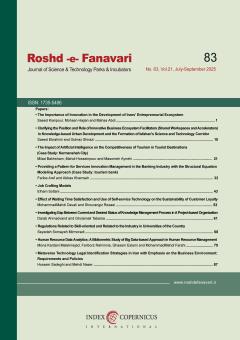Clarifying the position and role of innovative business ecosystem facilitators (shared workspaces and accelerators) in knowledge-based urban development and the formation of Isfahan's science and technology corridor
Subject Areas : Science and Technology Parks and IncubatorsSaeed Ebrahimi 1 , Golnaz shirazi 2
1 - Municipality
2 - -
Keywords: Knowledge-based urban development, knowledge-based economy, business ecosystem, innovation, system dynamics, Isfahan metropoli,
Abstract :
The knowledge-based urban development model considers the city as an ecosystem for the sustainability of knowledge, the realization of which depends on the realization of a knowledge-based economy, and to achieve a knowledge-based economy, the main elements of which are the production, distribution and application of knowledge, a platform for the creation of innovation must be provided. Targeted interactions and the exchange of knowledge cause innovation among individuals, groups and the creative class. Business ecosystems provide a high level of productivity by providing a favorable form of collaboration and partnership. One of the main components of these ecosystems are shared workspaces and accelerators, which try to reduce the gap between the current and desired status through innovation. In this research, using the system dynamics method, after identifying the main actors of the ecosystem of innovative businesses, their role and influence in urban development and knowledge-based economy was modeled and simulated. The general structure of the model includes 7 subsystems of population, education, information and communication technology infrastructures, research and development centers, knowledge-based companies, market and employment, which is simulated with the help of data collected by document method during the period of 2017-2018. The findings of the research show that the growth of support of accelerators and collaborative spaces for knowledge-based companies causes the growth of employment and the financial power of companies, and as a result, it helps to realize knowledge-based urban development through the formation of a knowledge-based economy.
